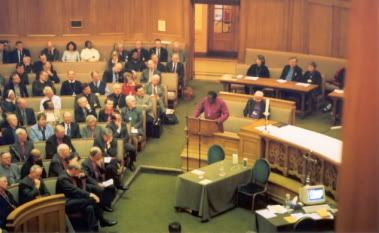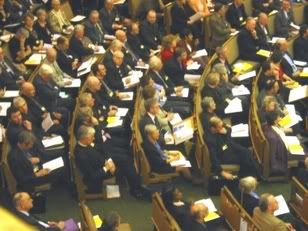
The General Synod of the Church of England is underway. I've enjoyed listening to some of the debate online. The issue getting the most attention this time around is considering the consecration of women to the episcopate. For those who are not aware, unlike the Episcopal Church in the United States, the C of E decided to act in stages because of a lack of widespread agreement--authorizing the ordination of women to only the priesthood in 1992.
One speaker (who was in favor of the measure, but thought it might not be the right time to make the change) made a point that I had not considered. He posed the rhetorical question about the problem of what if a female bishop ordains a male priest and then later on that priest comes to the point that he is not convinced that the ordination of women is God's will. There is no provision for him to be able to continue a priestly ministry in good conscience--by being either reordained or conditionally ordained. It would create a big mess. The speaker was illustrating that the measure has not been thoroughly thought through.
What the speaker did not go on to consider was the same problem on a church-wide scale. What if 50, 200, or 400 years down the road, the Church as a whole comes to the understanding that this innovation is not God's will in this process of "open reception?" Would we have created a bigger mess than can be cleaned up? Or would we simply fail to do the right thing because of being overwhelmed by the scope of the task involved?
With convention/synodical government in control of the Church and her laws, the unfortunate human compulsion to perpetually tinker with the system is fostered and given opportunity, but tinkering may not always a good thing.



4 comments:
Update from the Church Times:
THE Church of England’s General Synod agreed yesterday to further exploration of the Guildford proposals for transferred episcopal oversight (TEA), after a debate that lasted a full morning.
In the closing vote, on the proposed future form of oversight for the opponents of women bishops, a handful of Synod members abstained, including Christina Rees (St Albans) of WATCH and the Revd Dr Giles Fraser (Southwark) of Inclusive Church; but only one Synod member voted against.
The Bishop of Guildford, the Rt Revd Christopher Hill, and the Bishop of Gloucester, the Rt Revd Michael Perham, will “undertake some labour of revision and exploration” in connection with a further statement of “the theological, ecumenical, and canonical implications” of the proposals, the Archbishop of Canterbury told the Synod in Westminster
And this from Forward in Faith UK:
Forward in Faith welcomes the decision of the General Synod this week, by 348 votes to 1, to devote a further six months to exploring whether 'Transferred Episcopal Arrangements' (TEA) might form a basis for making suitable provision for those who in conscience will be unable to receive the ordination of women as bishops.
Forward in Faith also particularly welcomes the words with which the Archbishop of Canterbury brought the Synod debate to a close. Dr Williams said: "People have talked at times about differences of opinion and how the Church can live with differences of opinion. I think that the problem is, for those who are not content with the idea that we should go forward along the line of ordaining women as bishops, the problem is not one of opinion, it’s rather one of obedience. It’s one of obedience to Scripture, or obedience to the consensus of the Church Catholic. And, while that’s not a view I wholly share, I think we ought to recognise that that’s where it comes from, those who hold to it are not just thinking ‘this is a matter of opinion’. And therefore it is rightly and understandably a lot harder to deal with dissent if you are talking about what fundamentally comes down to a question of whether you obey God or human authority. That’s why it’s serious. That’s why it’s difficult. More than ‘opinion’."
Forward in Faith also notes with pleasure that all attempts to amend the resolution before Synod, including suggestions that the TEA proposal should be replaced by a single clause measure and code of practice, were soundly defeated.
The full text of the motion moved by the Archbishop and so overwhelmingly passed was as follows:
‘That this Synod
(a) welcome the assessment made in GS 1605 of the options for removing the legal obstacles to the ordination of women to the episcopate;
(b) consider that an approach along the lines of “Transferred Episcopal Arrangements”, expressed in a Measure with an associated code of practice, merits further exploration as a basis for proceeding in a way that will maintain the highest possible degree of communion in the Church of England;
(c) invite the House of Bishops, as part of its ongoing work on the underlying issues raised by the “Rochester report”, to produce for the July group of sessions a statement of the theological, ecumenical and canonical implications of such an approach;
(d) instruct the Business Committee to make sufficient time available at the July group of sessions for Synod to determine, in the light of advice from the House of Bishops, the next steps, including a possible timetable for legislation; and
(e) invite all members of Synod to reflect prayerfully and consult widely on the serious decisions now facing the Church.’
So, do you think you may want to move to England instead?
On a related note, here is the text of the recent renuncialtion of the ministry of Alice Lindsey:
VOLUNTARY RENUNCIATION OF ORDAINED MINISTRY
I, Alice C. Linsley, having been ordained a Priest in the Episcopal Church on the 27th day of June, 1988, voluntarily and with full knowledge of my rights, duties and privileges, pursuant to Title III, Canon 18 (1) of the Constitution and Canons of the Episcopal Church (2000) hereby renounce the vows I took in my ordination as a priest. I renounce my priestly vows because I no longer believe that women should be ordained to the priesthood and because I intend to affiliate with a Christian community that upholds Catholic Orders.
I ask that the Rt. Rev. Stacy F. Sauls, Bishop of the Episcopal Diocese of Lexington, accept this voluntary renunciation and recommend to the Standing Committee of the Diocese of Lexington that it be accepted and that I be released without prejudice from the obligations of the Ministerial office of Priest; and that the Standing Committee of the Diocese sign the document and enter it into the records of the Episcopal Church.
Alice C. Linsley
Post a Comment